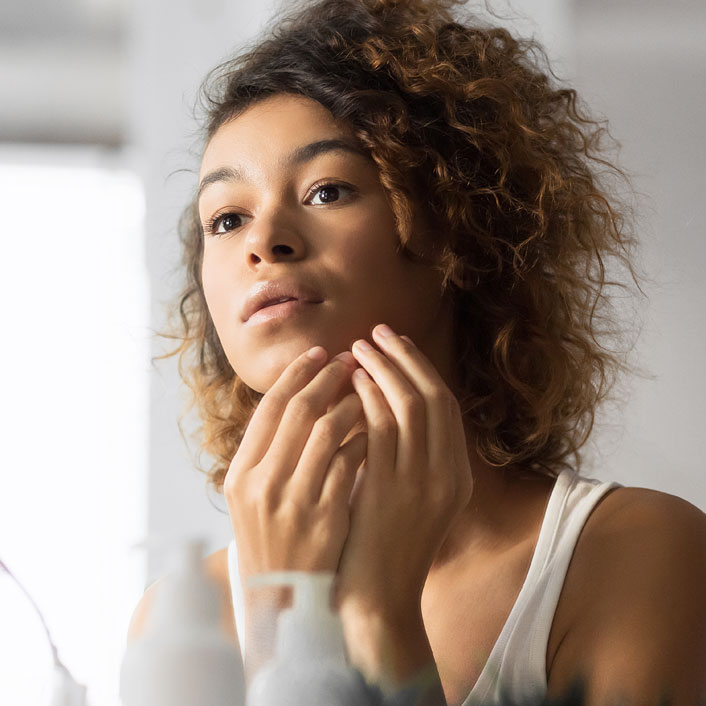Your Guide to the Best Skin Care and Makeup for Acne Prone Skin
For those who find themselves prone to regular acne outbreaks, a good skin care routine coupled with the right lifestyle changes can make a big difference. They key to enjoying a clear complexion with a healthy glow is understanding the causes of outbreaks and building a routine that minimizes your risk. For most of our customers, that means learning to pamper your face properly, because many of the top products with clinically proven ingredients that help your skin look smooth and well-nourished also support a healthy acne skin care routine. Understanding what makes your skin more likely to break out is the first step to learning to identify ingredients and hygiene habits that will antagonize the condition, as well as the ones that will help.

Patients who seek medical intervention for acne have a range of reasons for their higher oil production. A family history of acne points to genetic causes for the skin types most likely to be susceptible, but personal habits and everyday activities can play a role as well. Controlling outbreaks when your skin is prone to react means finding the right acne skin care products while avoiding the choices that lead to clogged pores and greasy skin, the biggest causes of outbreaks. In some extreme cases, prescription medication might be used to help control outbreaks, often because high levels of androgen production are also associated with a high risk of acne. Controlling androgen levels in turn helps reduce the risk, but it is a last resort after basic skin care and lifestyle changes, because hormonal intervention requires direct medical oversight.

Diet can also be a factor. While it’s an absolute myth that merely eating greasy or fatty foods can increase your chances of breaking out, it’s not a myth that there are foods that will increase those odds. Chocolate has long been suspected of doing so, although professional opinions about that are still divided. Recently, studies have confirmed that skim milk consumption and diets that include a high carbohydrate intake both increase the odds of severe breakouts. Acne skin care products can help mitigate this, but adjusting to a healthy diet with a more balanced carbohydrate intake will probably help them work better if you haven’t done so already.
Exposure to grease and oil can increase risks, too. In fact, without the right cleansing routine, it’s pretty safe to say there’s a direct relationship between over-exposure to products that put excess oil on your skin and breakouts. This is especially true if the oil is one that can clog pores easily, like many forms of industrial grease and petroleum-based oils. Similarly, habits that expose the skin to hair oils and conditioner could increase the odds of a breakout for susceptible people. Some patients even report flaring acne in locations where conditioner washes down their shoulders as it is rinsed out. This needs to be considered as habits are changed and an acne skin care routine is established.
Last but not least, skin irritation in general can also provoke an acne response by leading to pore blockage or by initiating a reaction that over-produces oils. Hats and communication headsets that put pressure on the skin or activities that cause skin abrasion can lead to breakouts or worsen them if them are already in effect. That even includes Bluetooth headsets for some people with extreme levels of susceptibility. It’s also worth knowing that stress is a factor in prolonged and extreme outbreaks. While it’s not a direct cause of breakouts, stress can make them worse or make them last longer.

The cosmetics that go over your foundation’s base layer like blush or contouring tones are less likely to cause irritation, but keep in mind that any makeup can cause irritation and outbreaks if it is left in place too long. Remember to use a cleanser nightly to remove makeup residue before bed so your pores can breathe, especially if you wear it daily.

- Alcohol: There are many forms of alcohol used in cosmetics, so identifying all of them when reading a list of chemical ingredients can be difficult, but it is essential. Alcohol enlarges pores, but it doesn’t cleanse them thoroughly. Sometimes, that leads to an increased chance of clogged pores that requires more frequent face washing and cleansing. It also dries skin, which creates a vicious cycle because most people apply more product to deal with dryness, especially if the product is supposed to be a moisturizer. The result is an imbalance in the skin’s moisture and hydration levels, and imbalance leads to outbreaks.
- Coconut Oil: There are a lot of natural cosmetic enthusiasts who believe in the power of coconut oil as a moisturizer, but for people with oily skin it is highly comedogenic. That means it’s very likely to clog your pores, and you’re going to want to give it a pass as a skin care ingredient. If you’re not allergic to coconut, though, it’s still a great choice for a healthy diet.
- Mineral Oil: Much like coconut oil, it’s highly comedogenic and causes oil buildup easily for those with oily skin types. For those with naturally dry skin, the situation may be different, but most acne prone skin is oily and not dry.
- Synthetic Lanolin: Natural lanolin can be a good ingredient for moisturizers because it is just that, natural. Unfortunately, the synthetic lanolin that is more widely used in cosmetics and skin care products today is just as comedogenic as the other oils listed here. If you use a lanolin product, make sure it contains 100% pure natural lanolin to minimize breakouts.
- Sodium Lauryl Sulfate: A lot of people with different skin sensitivities find this chemical aggravates their symptoms, and acne prone skin is no exception to that rule. It’s a foaming agent that is widely used in products like soap and shampoo, and it cleans by stripping grease and oil from your skin. This leads to irritation and can provoke a skin response that just winds up overproducing oil to compensate. Remember, your skin care routine for acne should focus on maintaining healthy moisture levels, not just stripping oil away.
- Silicones: Silicone oil and other additives with this element often seem to help with moisture levels and skin smoothness, but they do so in a way that clogs pores and lead to buildup. The body can’t absorb this element easily, so it stays on the skin. Often, that’s the reason it is used for smoothing creams and other anti-aging formulations, but it’s best to simply avoid these additives and to use products with natural ingredients that don’t cause breakouts.
There are four steps to healthy skin with a low incidence of acne symptoms, as long as you’re using products that won’t add to your risk of an outbreak. This routine is also a great routine for other skin types, so feel free to adopt it even if you’re not experiencing issues right now, because it could help prevent future breakouts.
- Start with a cleanser. We recommend a natural formulation designed to be good to sensitive skin, with hypo-allergenic ingredients.
- Apply your acne treatments as needed if controlling an outbreak.
- Moisturize well, preferably with a skin moisturizer that makes use of natural enzymes and Vitamin C for smoother, tighter skin.
- Apply sunscreen protection to keep your skin healthy.
The same routine can be repeated at night. Retinol creams in the night routine are a common addition, but be careful. Excessive retinol use on sensitive skin can lead to irritation.
In addition to your morning and evening skin routine, a few basic lifestyle changes can help you keep your pores open so you have less acne issues to contend with. Washing your face regularly whenever you break a sweat will help, as will the avoidance of any accessories or head gear that provides those abrasive irritation points that can lead to an outbreak. Regular exercise can also help keep hormone levels and other biological risk factors in balance when incorporated alongside a good acne skin care routine. The most important changes, though, are the ones to the products you use on your face and in your hair. Remember, shampoo and conditioner rinse out over your skin, so they need to be checked for high-risk ingredients just like your facial product. Wearing makeup for shorter periods of time and exercising makeup-free rest days is also a good idea when you are working on controlling acne.
Since high carbohydrate diets can lead to more outbreaks and more extreme outbreaks, adopting an intentionally balanced diet can help. In some cases, carbohydrate restricted diets might be appropriate, but that kind of program should be monitored by a doctor to ensure your long-term nutritional health and to monitor for any side-effects. Minimizing empty carbs like sugar is always a good step to take, though, and a healthy one that doesn’t involve giving up healthy, complex carbohydrates that provide dietary fiber and important nutrients. Basically, if it’s got empty calories in it, you might be aggravating your acne by indulging, so keep an eye on those sweets and other indulgences.
Remember, acne control is a process, just like any other health and wellness practice. While these tips and practices can help you enjoy healthier skin without uncomfortable breakouts, there is no instant cure. You’re likely to see improvements slowly, first with reduced outbreaks and symptoms. Many patients manage to suppress major outbreaks entirely with a good diet and skin care routine, though. Just remember, your skin care routine for acne is a tool for managing your skin’s health, not a guarantee all future symptoms will be suppressed. If you’re still having breakouts regularly, you may want to consult with a dermatologist about prescription strength solutions.
Building an Effective Acne Prone Skin Care Routine
Acne prone skin is a long-term condition that requires careful mitigation and [Read More...]
Acne Spot Treatment Products for Pimple-Free Skin
Acne is usually associated with the signs of growing up. The appearance [Read More...]
Best Acne Spot Treatment Products
Acne is a common skin condition that stems from clogged hair follicles. [Read More...]
Essential Skin Care Routine for Acne
Acne is one of the most prevalent skin issues that can be [Read More...]
Rosacea Acne Skincare Routine
Studies show that people with rosacea are more likely to get acne. [Read More...]
Essential Non Comedogenic Makeup Products for Summer
By Laura Bissessar The summer season may bring some unique challenges when [Read More...]
Best Skincare Routine for Oily Skin
Finding the proper skincare routine for oily skin can make a massive [Read More...]
The Best Skincare Routine for Acne
Pimples can be embarrassing and painful. Fortunately, finding the best skincare routine [Read More...]
How Do Acne Patches Work?
If you’re like most people, even occasional pimples can ruin your look [Read More...]
How To Prevent Acne Breakouts With Lifestyle Changes
For some of us, acne, along with death and taxes, is just [Read More...]











